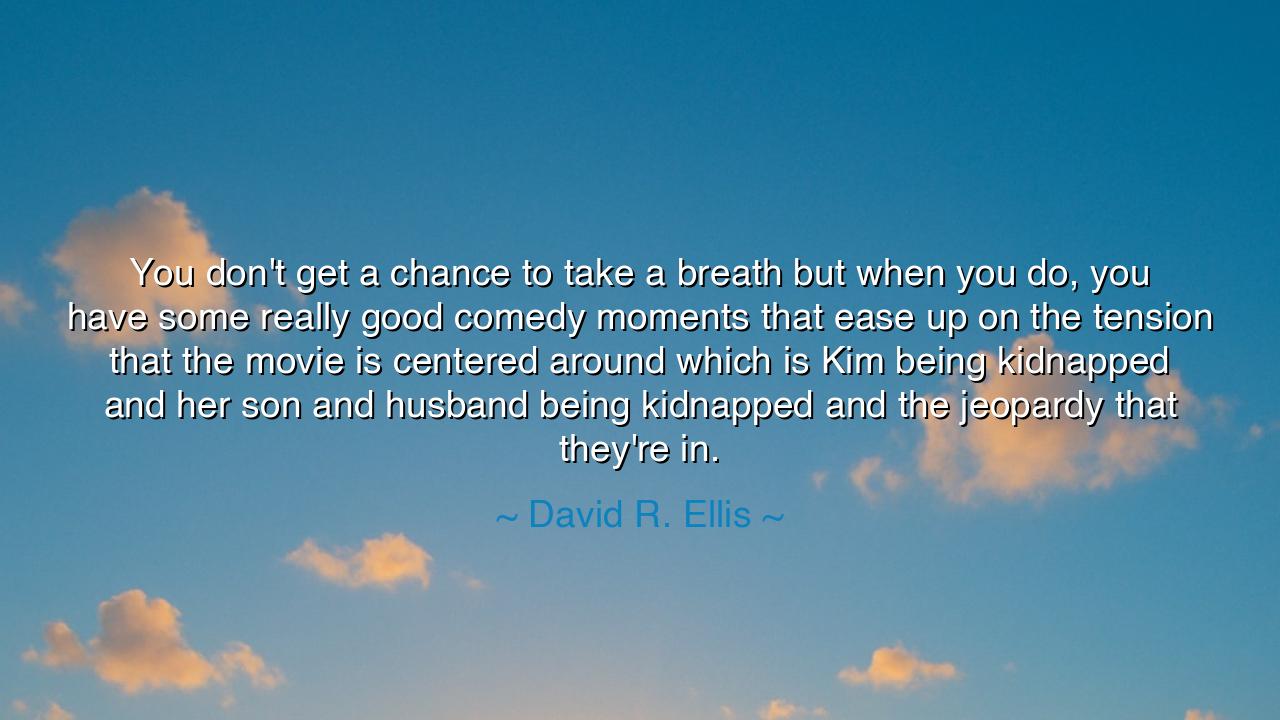
You don't get a chance to take a breath but when you do, you have
You don't get a chance to take a breath but when you do, you have some really good comedy moments that ease up on the tension that the movie is centered around which is Kim being kidnapped and her son and husband being kidnapped and the jeopardy that they're in.






In the great sweep of human experience, there are moments of intense peril, where every breath feels like the weight of the world, and the stakes of existence seem higher than ever before. Yet, as the ancient sages have taught us, in even the darkest of times, there exists the possibility of lightness—a chance to laugh, to breathe, to find moments of relief amidst the tension. David R. Ellis, in his reflection, captures this delicate balance when he says, “You don't get a chance to take a breath, but when you do, you have some really good comedy moments that ease up on the tension.” In these words, he reveals a profound truth about the nature of storytelling, where the most dramatic tensions are often punctuated by the lightness of humor, a tool that gives the soul a moment of respite, even in the most dire circumstances.
The ancients knew this well. Take the great Greek tragedies, for example—works that wrestle with the deepest struggles of fate, family, and destiny. The stories of Oedipus and Agamemnon are filled with unrelenting tension, with lives hanging by a thread. Yet, in the midst of such weighty matters, the playwrights often inserted moments of comic relief. These lighter moments, though fleeting, served to balance the darkness, to remind the audience of the human spirit’s capacity to endure, to laugh, and to breathe even when the world seems on the brink of collapse. In the same way, Ellis speaks of the power of comedy to lift the heavy burden of tension in storytelling, allowing the audience to find moments of release before they are thrust back into the heart of the peril.
Consider, too, the tales of old—the hero’s journey, where the protagonist faces seemingly insurmountable odds. Think of Odysseus, stranded far from home, caught in battles with gods and monsters, yet still able to find humor and moments of levity in his travels. His trials were great, his jeopardy immense, but it was in his ability to balance the moments of grief and joy that he truly embodied the human condition. As he journeyed home, he encountered gods who were both vengeful and playful, and in their playful moments, Odysseus found a chance to breathe, to laugh, and to remember that hope could be found even in the darkest of times. Ellis’ words reflect this ancient understanding: that humor, when used properly, can ease the tension of life’s great struggles, bringing balance to the soul.
In the modern world, where danger and suspense often dominate the screen, the art of balancing tension with humor continues to be vital. In his films, Ellis understood this delicate interplay—whether it is a character’s perilous escape or a family in distress, the brief moments of humor provide the audience with relief, allowing them to settle into the narrative once more. Much like the ancient performances, where the tragic hero’s pain was offset by the comic servant, Ellis weaves lightness into his work to give the audience a moment to breathe, a chance to laugh, and to return to the drama with a renewed sense of engagement.
Consider the story of Charlie Chaplin, a figure who masterfully blended the heavy and the light. In films like The Great Dictator, Chaplin created moments of deep humanity, depicting suffering and oppression. Yet, it was his deftness with comedy, the ability to draw out laughter from the gravest of circumstances, that gave his characters their enduring power. By using comedy to ease tension, Chaplin offered the audience a respite from the harsh realities of the world while still urging them to engage with the critical issues of his time. This is the same power that Ellis speaks of—comedy as a tool for the soul, a means to engage, to reflect, and to heal.
In our own lives, we too face moments of great tension—be it in our personal struggles, our professional challenges, or the broader difficulties of the world around us. It is easy to become consumed by the weight of these trials, to feel as though there is no space to breathe. Yet, Ellis’ insight serves as a reminder that in the midst of struggle, we must make room for lightness. Even in our most challenging moments, there is always a chance for a moment of laughter, a moment of release, a chance to breathe and reset. These moments do not diminish the seriousness of our challenges; they provide the balance needed to endure and to face our trials with a renewed spirit.
Thus, let us take Ellis' words to heart. As we navigate the struggles of our own lives, let us remember the power of humor—the way it can balance the tension, ease the soul, and allow us to continue the journey. Just as ancient storytellers understood the value of comic relief, so too must we find moments of joy amidst the chaos. When life becomes overwhelming, when the weight of the world seems unbearable, remember: breathe, and in that breath, find the moments of humor that will give you the strength to carry on.






AAdministratorAdministrator
Welcome, honored guests. Please leave a comment, we will respond soon